Celebrating Nursing Support Workers’ Day
Nursing Support Workers' Day is on 23rd of November, celebrating the important contribution nursing support workers make to patient care and health and social care services. This year some of our HCSWs are sharing their career stories.
Debbie Tyree, Interventional Radiology
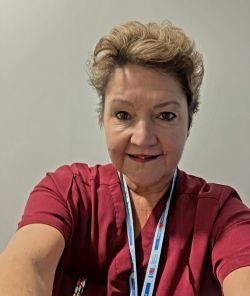
What inspired you to become a Healthcare Support Worker in the NHS?
I had raised my family and felt very much a need to do something for me, as it was now my time, however I really had no specific idea of what I wanted to do. I knew I was meant to do something; I just did not know what. I was lacking in confidence and felt very out of touch with technology and was frightened to be honest to be re -entering the working sector. My story began on the day that I was in GRH for the birth of my first grandchild (I was forty-nine!) I saw a handwritten advertisement on the notice board in the tower block opposite the coffee shop. It was for an RCA, which I had no idea what that was. I read the job description and requirements and in a moment of madness plucked up the courage to apply. I was in complete disbelief when I was offered an interview and even more shocked to be starting my new role as an RCA 12 weeks later. That was 13 years ago, and I am truly enthusiastic about my role and have also specialised in Intervention for the last 12 years. I am extremely proud to be part of the Interventional Radiology Team.
What do you love most about your role?
I love my role in the Interventional lab. We offer procedures done under local anaesthetic, which is a more positive experience for the patient. It means they do not have to recover from a GA, and they need to stay for a shorter period in the hospital. We are developing interventional techniques all the time so that we can treat more parts of the anatomy less intrusively and it is the way forward for future procedures. I feel immensely proud to be part of the team.
Can you describe a moment when you felt you truly made a difference?
It’s a feeling that surrounds me every day. Whether it be holding the hand of a very nervous patient, who has come for a cancer pathway biopsy and is scared for the result or maybe it’s the fact that if we hadn’t opened the blood supply to someone’s feet their toes or more serious still, their leg would have to be amputated. Knowing we have saved someone from bleeding out from a rupture or a trauma because we were able to embolise the blood supply or just chatting with an elderly patient and hearing their stories and life experiences whilst they are waiting for a procedure. Seeing the relief in relatives' faces when a procedure has gone well. Being able to make someone smile even in adverse circumstances. It is not grand gestures or specific incidents that make my role so rewarding. It is a feeling that stays with you every day.
How has your role helped you grow – personally or professionally?
My role has changed me for the better in many ways. As I shared before, I had lost my confidence and didn’t really know what my purpose was once my children had grown up. I felt out of touch and left behind by all the technology and it seemed a scary place to rejoin after so many years. However, now I feel proud every day to put my uniform on and to play a part in the Interventional Radiology Team. I know that the work we do can mean saving someone’s leg because we opened the blood supply or the chance to embolise a patient to stop a life-threatening bleed. We offer palliative solutions to relieve symptoms in cancer patients and we also perform crucial diagnostic biopsies to ascertain the correct patient pathway and care. It is rewarding daily and regularly brings new challenges. It really is life changing for the patient if we can help them. Their gratitude and appreciation are a massive reward for all the team. I have been lucky enough to be able to specialise in a specific modality and have learnt so much and grown in confidence beyond anything I thought possible 13 years ago. I will always be extremely grateful for that opportunity.
What would you say to someone thinking about becoming an HCSW?
Do not hesitate.
Grab the opportunity with both hands and you will find a feeling that is so rewarding. Knowing you make a difference every day to a patient or their family and relatives. It makes me so grateful for life and appreciate the blessings that you have, especially when you see the opposite end of the scale when families are grieving, and patients of all ages are sick. I wish I had not waited so long to find my dream role and am extremely grateful that I am a HCSW now. It makes me immensely proud.
Yordanka Ivanova, Endoscopy
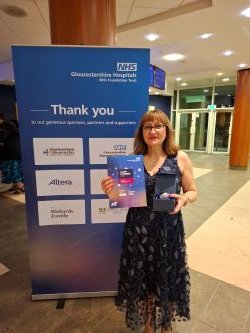
What inspired you to become a Healthcare Support Worker in the NHS?
I worked as a HCSW in a Nursing Home, but I was missing the clinical environment. When I came here, I loved the clinical knowledge and the feeling that we are like a family.
What do you love most about your role?
I love learning new things every day. There are many courses to help me add to my knowledge and expertise to better understand the needs of our patients. I love the opportunities to develop myself at work and help my colleagues to achieve the same. Practicing knowledge and skills acquired as an apprentice in Leadership and Management fills my heart with gladness and happiness.
Can you describe a moment when you felt you truly made a difference?
There was a time when I discovered an opportunity to become a Team Leader/Supervisor at Level 3 through an Apprenticeship Programme. I passed my English and Maths Functional Skills, and was successfully enrolled in the programme. When my journey as an apprentice began, I realised that I had motivated a lot of the staff members to want to enrol in the same programme. During that time, I participated in cross-team working with the Booking Office, making our jobs more understandable to one another, shortening the distances between teams and breaking down the silos in which we used to work. It had a positive effect on patient care and especially on reducing waiting times. I helped Jen Cleary and Dr Luke Materacki to implement a green endoscopy project.
In January 2025, I passed the exam successfully. I loved this programme so much that I decided to apply for a Master's degree in Management. I was accepted by the Walbrook Institute London. The course commences next year.
How has your role helped you grow – personally or professionally?
It helped me a great deal in my career progression and personal growth. Starting from my first link role "Waste Management", which helped me to participate in a trust-level project on introducing tiger bins related to making our hospital green, through learning how to mentor people, to coach people and to help them finish their Care Certificate on time. Also, I became a fit tester for the FFP3 masks. I am looking after a T-level student who managed to complete his Care Certificate and was accepted as a bank worker in our hospital.
I became a member of BSG. I went to a 4-day conference in 2023 in Liverpool. I liked it very much so that I attended the winter BSG online conference with the money I won as a winner of the Richards Family Bursary in 2023. The note taking was so successful that I am still circulating these lectures to our new doctors, student nurses, clinical endoscopists, nurses and HCSWs.
What would you say to someone thinking about becoming an HCSW?
It is a great start for workers who love a clinical environment. It has the potential for development and achievements as well as keeping the role interesting through a variety of activities.
Thomas Summers, Radiology
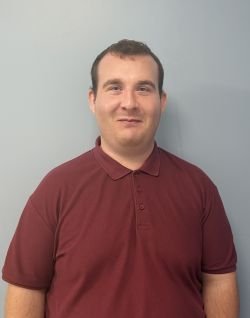
What inspired you to become a Healthcare Support Worker in the NHS?
I have always wanted to work in healthcare, helping people from all walks of life, I have always wanted to be a paramedic, but I saw this job come up and thought I want to apply for this as it gives me two options to progress with my career. I like to help people when they need it most.
I used to work in mental health and wanted to progress onto something else and I thought this role was for me and it is.
What do you love most about your role?
I enjoy the patient interaction, helping people when they need it most and seeing people get better when they come into the Radiology department at their times of ill health.
Can you describe a moment when you felt you truly made a difference?
In the radiology department I feel like we work well as a team when we are short staffed, we still go above and beyond to help people have scans on time or if it is needed urgently everyone joins in and helps each other leading to good patient care.
How has your role helped you grow – personally or professionally?
My role has helped me to become a more person-centred speaker due to working on reception desks when booking patients in and improving my communication skills and confidence. The role will hopefully help me with my career development in the future.
What would you say to someone thinking about becoming an HCSW?
I would say do it if you like helping people and want to make a difference to people's lives. I would say you need to have a good sense of humour and compassion. I don't regret moving jobs to help me grow in myself and with my career as well.
Georgina Poke, Emergency Department
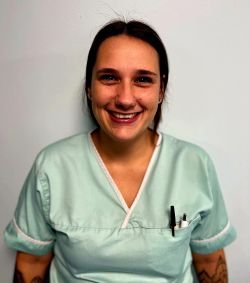
What inspired you to become a Healthcare Support Worker in the NHS?
Wanting to help and care for people with so much variety on what path to choose.
What do you love most about your role?
I’ve almost lost track of the many skills I have acquired during my years and with these skills, the patients I’ve helped.
Can you describe a moment when you felt you truly made a difference?
Calming patients with serious emergencies, I had a patient that came into resus, who was very anxious, and we had many from the multidisciplinary team. I stayed with the patient as long as possible and helped by doing obs, ECG and bloods as doctors were discussing his serious situation and made the patient felt better even though everyone knew it wasn’t going to be a great outcome. That patient was so thankful about being treated like a human rather than a problem and he said he will always be thankful for his last moments of living that I provided great care.
How has your role helped you grow – personally or professionally?
My role gives me a lot more confidence.
What would you say to someone thinking about becoming an HCSW?
Great place to start if you ever want to get into the care setting.
Lu Titcombe, 3a NOF & Trauma
What inspired you to become a Healthcare Support Worker in the NHS?
I joined the NHS with an admin role. I realised while working in the physiotherapy department that I wanted to work on the wards, face to face with patient care. I got myself redeployed onto the wards.
What do you love most about your role?
I love working with people, seeing them get up on their feet and get better is hugely satisfying.
Can you describe a moment when you felt you truly made a difference?
We had a lady on the ward using a ‘Sara steady’ to help mobilise though she was reluctant to make more effort herself even though I knew she could. When she rang for assistance the next time, I went to her on my own determined we were going to do this. She must have taken in what I had said as she stood herself straight up with hardly any help from me. I was so proud of her I had tears in my eyes. I was even more pleased when I came back from a few days off and saw her walking with a frame.
How has your role helped you grow – personally or professionally?
I feel truly satisfied in my job. It is hard work physically, but it so rewarding I don't notice that it is hard work.
What would you say to someone thinking about becoming an HCSW?
If you like working with people and caring for people, then this is the job for you. It is tough at times, but the rewards are great.
Anil Thomas, Emergency and Obstetrics Theatre
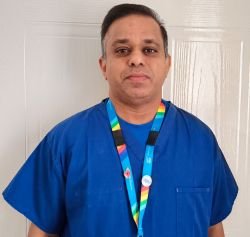
What inspired you to become a Healthcare Support Worker in the NHS?
It is an opportunity to show our kindness and support to all age groups. It is a great opportunity to understand the challenges people face especially when they are sick. They look for physical as well as mental support. Furthermore, it is an opportunity for each one of us to take care of the other human beings who need a hand, and we must offer it without a second thought.
What do you love most about your role?
It is a great opportunity to help people especially when they are in a hospital. A hospital is not a common place for people especially when they are in sound health. Each patient has a different mental state, anxiety and fear. This is the best opportunity for us to support, help and give assistance to people who may be nervous. When the patient recognises there are staff, who with kindness, can help to improve their wellbeing and the patients are able to find their voice and speak up. It is our responsibility to serve the community by using our presence of mind, empathy as well as delivering good patient care. I always love to go the extra mile to help my patient and that is what a HCSW must do. We need to thoroughly understand that everyone's life cycle is going to have its ups and downs and we have to be there to make a difference when a patient needs help and support.
Can you describe a moment when you felt you truly made a difference?
As an operation theatre staff we need to work as a team rather than an individual perspective performance. However, when I get a chance to work in Obstetrics theatre I always make sure that the partner or the person who accompanies the mother also receives the same importance as the patient. As an HCA I always provide a chance for them to take a picture of the board which shows the various information including baby born time, baby's weight, baby's head circumference, patient theatre entry time, etc. Even though these are small things for us in our daily routine of duty it is important information for a proud father and mother which will be a treasure for them. Through these small actions we can win the hearts of our patients.
How has your role helped you grow – personally or professionally?
As a Healthcare Support Worker I always look in to the area where I can develop by delivering great care to the patient. As operation department healthcare staff, first and foremost the thing that we need to do is to calm the nervousness of each patient who visit. There are a lot of opportunities to attend different seminars and training sessions led by experts which really help us to increase our knowledge on a daily basis. Furthermore we are getting an opportunity to work with nurses, doctors, anaesthetist, radiologists as well as many other experts who are well versed knowledgeable people. Overall it is a great platform to build a career that is always improving patient care.
What would you say to someone thinking about becoming an HCSW?
There are ample opportunities to learn and develop your career through various training as well as career based courses related to clinical and non clinical such as leadership management, theatre etiquette etc. We can develop our career through apprenticeships, operating department practitioner (ODP) courses. Full-time and part-time work patterns are available. I was working in sales and marketing for 17 years and this job was really challenging for me at the beginning stage, especially to remember the medical terms. My colleagues and senior sisters also helped me to clear my doubts and concerns. Most importantly the management provided a lot of information about various training sessions and they adjust my duty schedule to attend the training programme to convert me from a sales person to a healthcare professional.
Michelle Hastings, Hatherley Ward
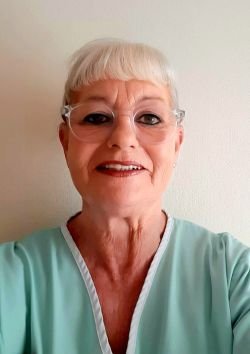
What inspired you to become a Healthcare Support Worker in the NHS?
A passion I had as child having served in the Red Cross.
What do you love most about your role?
Fulfilment that I have made a patient feel cared for, appreciating that they feel scared, respecting their dignity and enjoy sharing their stories.
Can you describe a moment when you felt you truly made a difference?
Being with family of a patient who was End of Life and sharing their loss. The family stated that they were overwhelmed with my compassion, understanding and empathy with lots of thank yous and hugs.
How has your role helped you grow – personally or professionally?
Personally, I feel that my role is what I was born to do and working with the NHS gave me this opportunity. It also has built my confidence with communication and Nursing skills. Learning - I have learnt a lot and training is amazing, there's always something new around the corner.
What would you say to someone thinking about becoming an HCSW?
Those who are passionate to become Nurses, I would strongly recommend becoming a HCSW as it gives them first-hand experience into what the job entails and will enhance their nursing skills before taking the next step.